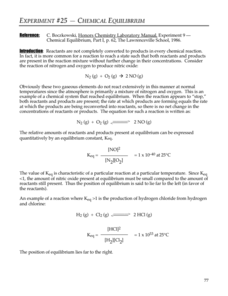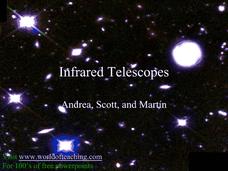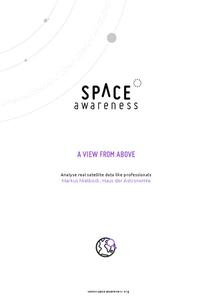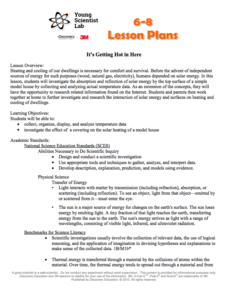Pingry School
Chemical Equilibrium
We know about the light spectrum, the age spectrum, and sound spectrum, but do chemical reactions also occur on a spectrum? Young scientists experiment with partial reactions on a spectrum and observe the color changes. Then, they...
Curated OER
Photosynthesis
If you need summary notes for independent study, or a Powerpoint to review as a class, then these slides will fit your need. There are really great, quite detailed, diagrams and some slides to summarize the 2 stages of reactions in...
Curated OER
The Sun's Energy
Sixth graders examine how the sun's energy arrives as light with a range of wavelengths. They discuss the characteristics of light, examine the color of light using a spectroscope, and conduct an experiment using water and thermometers....
Curated OER
Now You See Me, Now You Don't
Bioluminescence fascinates most upper elementary scientists. Display images of different glowing deep-sea organisms and discuss their environment. Young biologists then experiment with images and different colors of filtered light. In...
Curated OER
Albedo and Irradiation of Surfaces
Here is a physical science activity where pupils place thermometers inside of a white and a black paper pocket and place them under a lamp. They record and compare the temperature increase over a ten-minute period. Have your class...
Wild BC
The Greenhouse Effect: The Role of CO2
Though this is meant to be second in a two-part lesson, the two are not dependent on each other. Pupils play the roles of visible light rays, light or dark surfaces, and carbon dioxide molecules. They interact and react according to...
Curated OER
Everybody Needs a Little Sunshine
Three activities introduce upper elementary ecologists to photosynthesis and food webs. In the first, an experiment is set up to determine how plants respond to different types of light. In the second, they connect organism cards with...
Curated OER
Infrared Telescope
Most of the twenty slides in this presentation include photographs or diagrams, making it an eye-catching way to teach about infrared telescopes. The pros and cons of using infrared light to study outer regions of space are explained....
Curated OER
Herschel Infrared Experiment
Learners perform a version of the experiment of 1800 by the famous astronomer Sir Frederick William Herschel.
Curated OER
Obtain a visible spectra of chlorophyll a
High schoolers become familiar with the concept of spectroscopy or the study of the interaction of matter with electromagnetic radiation. They prepare solutions and measure absorbance at different wavelengths. Pupils comprehend that...
Curated OER
Color, Computers, and Math
Young scholars visit a web page that gives a brief introduction to two color models and experiment with mixing different color intensities to create different colors. They visit links that give more detailed information on color.
PBS
Blow the Roof Off!
Blow the minds of young scientists with this collection of inquiry-based investigations. Based on a series of eight videos, these "hands-on, minds-on" science lessons engage young learners in exploring a wide range of topics from making...
Space Awareness
A View From Above
Analyzing and interpreting satellite data takes knowledge and patience. Through a detailed lab investigation, young scholars learn the process of analyzing this data. They use technology to create color images and maps from real...
Santa Monica College
Flame Tests of Metal Cations
Scientists used flame tests to identify elements long before the invention of emission spectroscopy. Young chemists observe a flame test of five metal cations in the fourth lesson of an 11-part series. Individuals then work...
It's About Time
Identifying Matter
High schoolers test wood splints that have been soaked in mystery solutions to identify the different colors it produces when lit. The lesson concludes with a reading passage and analysis questions.
Teach Engineering
Thirsty for Gold
In the last portion of the six-part unit, teams perform an experiment with gold nanoparticles to determine which sport drink has the most electrolytes. The nanoparticles are used as chemical sensors and fluoresce in different wavelengths...
Discovery Education
It's Getting Hot in Here
Class members engage in a STEM experiment and investigate how materials affect heating in a house by creating models of houses and using different top surface materials. They record the temperature inside the models and consider what the...
Curated OER
Every Color in the Rainbow
Pupils brainstorm and discuss the amazing world of rainbows. They draw and color rainbows and look for natural rainbows that occur whenever white light is split into the spectrum and the rainbows that can form on soap bubbles and fish...
National Wildlife Federation
Quantifying Land Changes Over Time Using Landsat
"Humans have become a geologic agent comparable to erosion and [volcanic] eruptions ..." Paul J. Crutzen, a Nobel Prize-winning atmospheric chemist. Using Landsat imagery, scholars create a grid showing land use type, such as urban,...
Beyond Benign
Electron Transitions
Ready for a lab with a lot of razzle-dazzle? Young chemists observe flame tests of common salts through an always-popular activity. The updated resource focuses on observation skills, collaboration, and green chemistry practices.
PBS
NOVA Sun Lab Lesson Plan
Looking for a sun-sational multi-lesson plan full of videos, simulations, and discussion? Introduce your young scientists to all things solar with a four-part hands-on adventure. Pupils learn the basics of solar anatomy, space weather,...
Rice University
College Physics for AP® Courses
Take a look at an organized physics course. The 34-section electronic textbook covers material in AP® Physics 1 and 2. Teachers use the text to supplement lectures and have the class work through the labs. Each section contains multiple...
Curated OER
Spectroscopy Demonstrations
Students study light and see what emits photons and that light can be separated onto a spectrum. In this energy and matter lesson students identify gases using a spectrum chart.
Curated OER
Projecting Spectra
Pupils use two methods to show and study the colors in the visible spectrum.
Other popular searches
- Light Spectrum
- Visible Light Spectrum
- Light and Color Spectrum
- Light Spectrum Stars
- Light Spectrum Waves
- Light Spectrum Activity
- Light Spectrum and Colors
- Light Spectrum and Waves
- Newton's Light Spectrum
- Light Spectrum \ Stars

























